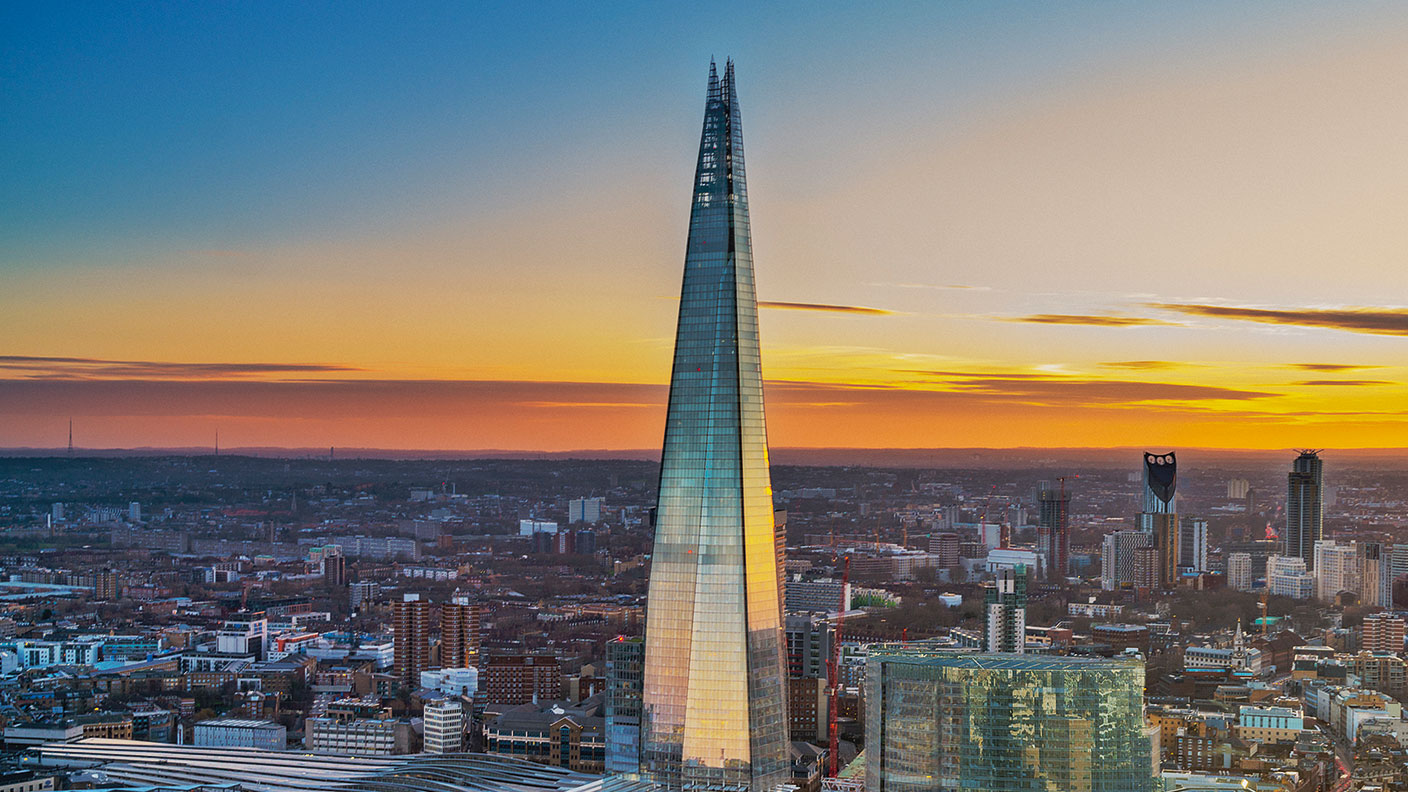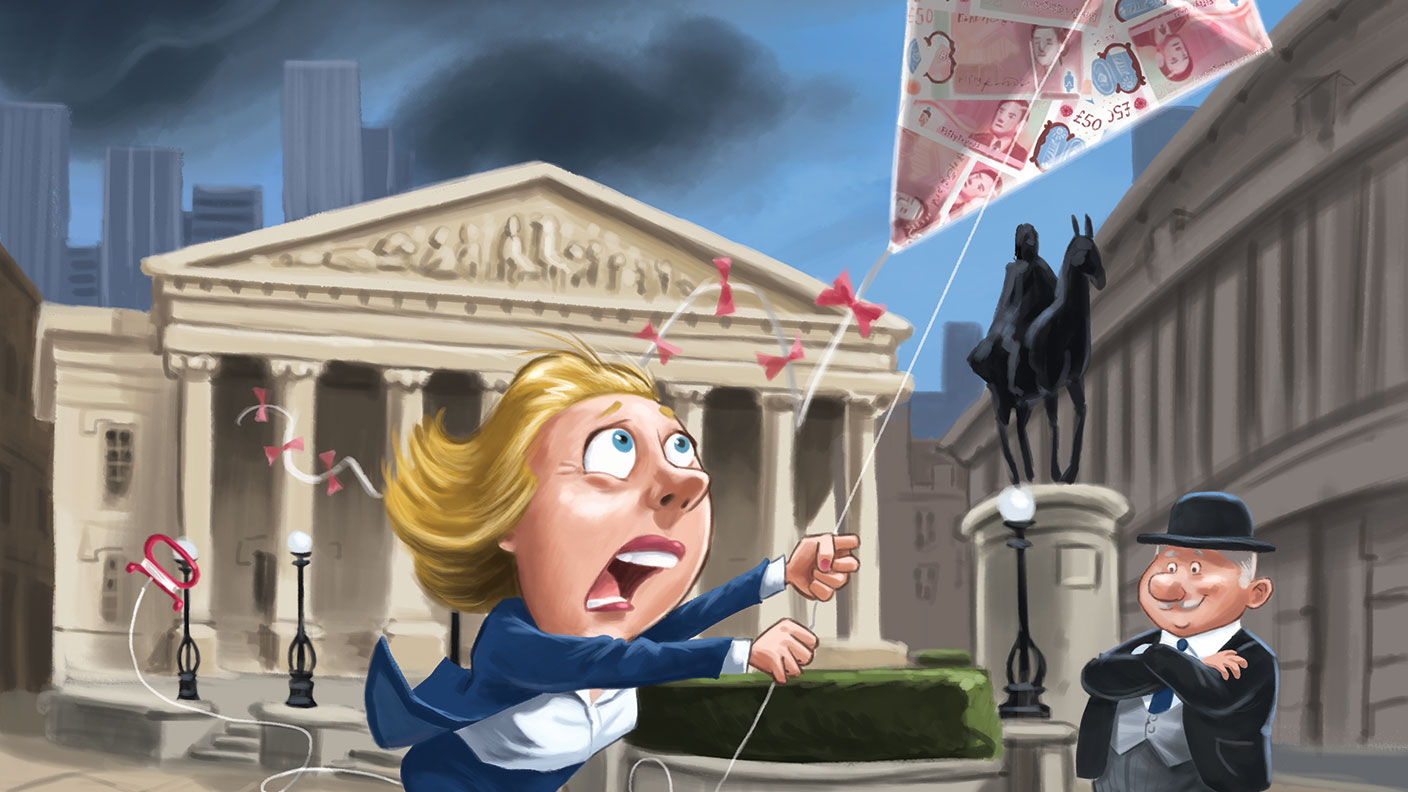Tourism is booming as China’s consumers head abroad
The world’s biggest travellers are still Europeans, but emerging markets, led by China, are now spearheading a new phase of a long-term upswing in worldwide tourism, says Jonathan Compton.
Get the latest financial news, insights and expert analysis from our award-winning MoneyWeek team, to help you understand what really matters when it comes to your finances.
You are now subscribed
Your newsletter sign-up was successful
Want to add more newsletters?

Twice daily
MoneyWeek
Get the latest financial news, insights and expert analysis from our award-winning MoneyWeek team, to help you understand what really matters when it comes to your finances.

Four times a week
Look After My Bills
Sign up to our free money-saving newsletter, filled with the latest news and expert advice to help you find the best tips and deals for managing your bills. Start saving today!

The world's biggest travellers are still Europeans, but emerging markets, led by China, are now spearheading a new phase of a long-term upswing in worldwide travel, says Jonathan Compton.
Unlike most commentators, I know how the world is going to end. It will not be because of a nuclear winter, nor will it be from global warming. It will not be from overpopulation: fertility rates are falling faster than expected, so the world's population may start to decline as soon as 2050. No, the end is going to be a sudden collapse in the world's ecosystem caused by the unstoppable rise in global tourism.
On a recent trip to several of the Canary Islands, I was again reminded how rapidly we have destroyed the things we love. Gran Canaria is utterly unlovable. Three quarters of the land is now a man-made wasteland of deserted farms, destroyed tree cover and chronic overdevelopment. With nearly five million visitors a year and an unsustainable population of more than 800,000, it is doomed, if only through lack of water and erosion.
MoneyWeek
Subscribe to MoneyWeek today and get your first six magazine issues absolutely FREE

Sign up to Money Morning
Don't miss the latest investment and personal finances news, market analysis, plus money-saving tips with our free twice-daily newsletter
Don't miss the latest investment and personal finances news, market analysis, plus money-saving tips with our free twice-daily newsletter
Yet many islands, cities and countries have little choice but to embrace tourism because it has become a vital driver of economic growth and income. In countries such as Malta, Iceland or Fiji, tourism accounts for between a quarter and half of GDP. In a few even more extreme cases, such as the Maldives or Seychelles, tourism is essentially their entire economy, comprising 77% and 65% of GDP respectively. International tourism, however, is a relatively new phenomenon.
How the tourism boom started
Until the early 1960s, foreign travel was expensive and slow. Moreover, many countries such as the UK had exchange controls, so the cash you could take overseas was very limited. The many beautiful, unspoilt and exotic destinations were precisely what most of these tourists did not want, so they tended to confine themselves to safe and well-tested destinations such as London, Paris, Spain, or the Riviera. Other places were considered too dangerous or uncivilised; worse, travellers would have to eat alien food. Even now, a third of all Britons travelling overseas take tea bags, even to India; 20% carry toilet rolls.
All these turn-offs disappeared over the next two decades. Thanks to cut-price pioneers such as Sir Freddie Laker and the breakdown of national airline cartels, travel costs tumbled. Meanwhile, several mostly US companies saw opportunities in developing hotels and resorts tailored to their countrymen's needs overseas, while developing nations recognised that foreign visitors could be a cash cow. After three decades of strong post-war economic expansion, incomes had grown so steadily in the advanced countries that even "ordinary people" could now afford to travel abroad. Most important of all, perhaps, is that travel became fashionable and for the next generations, both a right and a tradition.
By 1980, according to the United Nations World Tourism Organisation (UNWTO), there were 300 million tourist arrivals globally. In 2017 this number had more than quadrupled to 1.3 billion, within which about three quarters were holiday travellers, the remainder on business trips. That year saw the highest annual growth rate (7%) since 2010 and these tourists spent $1.3trn, or about $1,000 per head. The 800lb gorilla in terms of both destination and expenditure is Europe. In 2017 it attracted more than half of all international arrivals, who spent $519bn, or 40% of total world tourism expenditure. In turn, Europeans travelling to other countries are still the largest group globally, accounting for about 40% of all international visits and expenditure. But as the song goes, "you ain't seen nothing yet".
Tourism goes global...
We are now about to enter a second key phase of the multi-decade tourism boom. Gradually other countries have reached income levels high enough that their citizens, too, can afford to travel overseas, while their governments have ceased trying to prevent them doing so. First out of the blocks were the Japanese in the 1970s. For a while they so dominated some Asian tourist destinations that department stores would often mark their prices in Japanese yen (at excruciatingly bad exchange rates). Others, such as South Korea, soon followed Japan. Now, overseas travel is going global, from Brazil to Russia and the biggest of all, China.Chinese tourism is a phenomenon. Not in terms of foreign arrivals or expenditure within China, which at around $35bn is less than in several European countries, but in the explosive growth in the number of Chinese travelling overseas. In 1997 there were only five million foreign trips taken by people from China. By 2010 the number of Chinese travelling overseas reached 62 million and eclipsed the number of Americans for the first time. In 2017 there were 143 million foreign trips by Chinese citizens, compared with 87 million by Americans; they spent $261bn, making them the biggest spenders of any nationality.
"A third of Britons travelling abroad take tea bags,even to India; 20% carry toilet rolls"
... and has vast scope for growth
This explosive growth has occurred despite the fact that of China's 1.35 billion people, less than 8% even own a passport (compared with 42% in America and 76% in the UK), so the numbers will rise exponentially. Chinese tourists' preferences, like the Americans before them, look likely to reshape the sector. According to the research group Nielsen, the Chinese are far more interested in natural landmarks than non-Chinese tourists (45% versus 38%), relatively uninterested in historical sites (38% vs.48%) and very keen on theme parks (41% vs. 27%).
They are more likely to take a package tour, and of any major tourist group are the most interested in food and shopping and far more inclined to pay electronically. Growth in Chinese travel is highest outside Asia. And despite relatively low income per head, when they take trips particularly to Europe or the US they become the world's greatest shopaholics. Many luxury brands are now dependent on demand from Chinese tourists and within China. Moreover, not only is this phenomenon relatively new, it is a reminder that two thirds of the world's population is based in Asia and has only just caught the West's travel bug. It is simply a matter of time.
Outpacing the world economy
How important is tourism to the world economy? Surprisingly, it's hard to say precisely. The UN, World Bank and other government agencies tend to extol its virtues and exaggerate the benefits without thought or evidence. One false and much-repeated statistic is that tourism is the world's third-largest sector and accounts for more than 10% of global GDP "when direct, indirect and impacts' are taken into consideration". This is flawed; it includes not only all business trips, but also "domestic tourism".
This is the largest component of tourism overall, but often a nation's entire hospitality sector is counted from going to the pub to a weekend away visiting Aunt Gladys in her nursing home. Impacts include new roads, hotels and other infrastructure development, which would probably have taken place anyway. Claims such as those by the World Travel and Tourism Council and UNWTO are also unproven: that tourism supports 319 million jobs worldwide or accounts for 20% of all jobs created in the last five years.
On a more rational expenditure basis, travel and tourism account directly for about 2.2% of global GDP; adding back provable spin-offs, such as tour buses or restaurant visits, this rises to about 3%. It is therefore still a major and fast-growing business at a time when many of the world's key economic drivers, such as consumption or the carmaking industry, are spluttering, and will continue to grow much faster than the world economy.
For the last eight years international tourism has increased by 3.9% a year. Consensus forecasts are for 4% growth for the foreseeable future. I suspect 5% will prove nearer the mark, which means thatin just 14 years' time the number of international arrivals will double; by 2033 the world will have 2.7 billion tourists, often crowded into a relatively small number of places.
"UK visa requirements are expensive and time-consuming for many foreign visitors"
Tourists are flooding into Britain
If Europe is tourism's gorilla, then the UK is one of its most impressive beasts. Overseas and domestic tourism, together with the hospitality industry (encompassing visitor attractions, hotels, bars, cinemas and the like) account for around 10% of all jobs and 9% of GDP. The average annual growth rate over the last 20 years has been 3.8%, nearly 1% more than the rest of the economy. It is the third-largest source of foreign income after financial services and chemicals. Yet for all its importance, government funding has been minuscule and tourism remains tucked away as a sub-department in the Department for Digital, Culture, Media and Sport. Worse, UK visa requirements and costs for many tourists, such as those from China, are expensive and time-consuming when compared with other top destinations in Europe.
Yet still they come in hordes and spend billions. About 39 million tourists visited the UK in 2017, making us the seventh-most-popular global tourist destination. The majority came from Europe, followed by the Americas. They spent a handy £25bn (a 9% increase over the previous year): £640 per head during an average visit of eight days. These are impressive numbers, but are dwarfed by those of British travellers abroad. In 2017 we spent £45bn on overseas travel, meaning there is a £20bn tourism deficit. We made a record 72 million foreign visits. Relative to our population, we travel overseas more than the people of any other major nation.
The ugly side of the tourism boom
However, tourism can create serious problems. A major city like London can easily absorb millions of tourists, but smaller destinations cannot. Many complaints have arisen about the impact of mass tourism. This includes the Isle of Skye, where the queues in summer merely to cross the bridge tail back for miles (residents also complain they are drowning in tourist ordure). England's highest peak, Scafell Pike, suffers serious erosion along with much of the Lake District. Many ancient buildings are suffering irreparable structural damage.Overseas, cities are being overrun by hordes of visitors, hence protests in Barcelona, Venice, Dubrovnik and Mallorca, insisting that "tourists go home". Mount Everest is now the world's highest and longest rubbish dump. Tourism is especially disastrous for coastal areas, worsened by the fastest-growing segment of the tourist industry, cruise ships, reflecting the fact that the world is getting older and fatter.
"In Turkey, despite an attempted coup, tourist arrivals hit record levels last January"
They are an eco-disaster. Many ports lack the facilities to handle human or other waste, so it goes into the sea then drifts to other sensitive areas. They can also cause significant land erosion. Just offshore from the Cayman Islands' small capital of Georgetown, cruise ships have destroyed more than 300 acres of coral reef in a handful of years simply by dropping their anchors. They also strain local water, energy and food supplies.
Yet the benefits are slim; a torrent of people for a few hours buying trinkets. Much eco-tourism can be worse and simply a marketing ruse. For every patch of jungle preserved by tourist funding there will be several large new eco-hotels and consequent damage. Ecology matters financially, as India is finding out with 22 of the world's 30 most polluted cities. Tourism to cities such as poisonous smog-shrouded Delhi is declining. Cities are beginning to take action: Edinburgh is proposing a £2 per room per night tourist tax. Thailand is considering absolute controls on numbers, while Bhutan, Nepal, and the Indian Himalayan province of Sikkim have already started to bring in quotas and fees for tourists, a sensible route to preserving long-term tourism and ecology.
The early stages of a global megatrend
Nevertheless, the tourism cycle has many years to run. Leisure has long been a growth industry and tourism its poster child. Everyone wants holidays and more are able to afford them. The 56% of lottery millionaires who "want to expand their life experience through travel" reflect an almost universal desire. Occasionally global events such as the financial crash or regional events like the "Arab Spring" cause a setback, but these prove remarkably brief. In Turkey, despite a recent attempted coup and its descent into dictatorship, tourist arrivals in January were close to an all-time high. I recommend a variety of investments in the global tourism boom below.
What to buy now
Investors ought to be invested in the tidal wave of tourists from China. There are dozens of companies and more than 45,000 travel agents, many of which will fail. But Nasdaq-listed Ctrip.com International (Nasdaq: CTRP), with a market capitalisation of $29bn, is the big player, with a 40% share of online travel booking. It is the largest group in package tours, travel-related finance and airline ticketing, both for domestic and overseas travel. The stock is far from cheap and profit margins are thin, but it is a proven growth story.
Less racy is Genting Singapore (Singapore: GENS), one of only two Casino groups in the country, which is a popular destination for Chinese gamblers and tourists. Genting has a market cap of $14bn. Well regulated and managed, it should enjoy steady growth. On a multiple of 17 times and a yield of 3%, it is good value.
Hotels are a key beneficiary of the China surge. Enter Hong Kong and Shanghai Hotels Ltd (Hong Kong: 0045). Its best-known brand is the upmarket Peninsular chain, with operations across China, Asia and leading Western cities accounting for around 60% of revenue. The group is controlled by the conservative Kadoorie family, so debt is low. Recent results show high occupancy rates. It trades at a discount to its underlying assets. It sells for 19 times earnings and yields 2.8%.
UK-listed InterContinental Hotels Group (LSE: IHG) is a major global player in hotels, usually operating franchises rather than owning the sites. Last year it added a record number of rooms (the key brand is Holiday Inn) and it continues to grow both through acquisition and organically; free cash flow was strong and revenue per room rose by 2.5%, while debt fell 17%. It is not cheap, but it has massively outperformed the FTSE All-Share index over the last few years, which I expect to continue.
The other major UK hotel group, Whitbread PLC (LSE: WTB), is in the process of breaking itself up by selling its Costa Coffee operations to Coca-Cola, with most of the proceeds to be returned to shareholders. This leaves it with 785 Premier Inns, the largest network of hotels across the UK providing budget rooms, and a number of restaurant chains. Overseas operations are small, but expansion has begun, especially into Germany.
Many people use and loathe Ryanair Holdings PLC (LSE: RYA) in equal measure, but despite often rapacious practices, it wins on the number of flights, connections, convenience and price. The share price has been battered by union troubles, Brexit fears, and management stupidity. But it will remain a major player in tourism and, despite further headwinds, I think it is too cheap on a multiple of 12 times with low debt.
Finally, Whitbread, IHG and Ryanair are among the top-ten holdings of a small exchange-traded fund (ETF) tracking an index comprising pan-European travel and leisure companies. The iShares STOXX Europe 600 Travel & Leisure UCITS ETF (Frankfurt: SXTPEX) has an ongoing charge of 0.46%.
Get the latest financial news, insights and expert analysis from our award-winning MoneyWeek team, to help you understand what really matters when it comes to your finances.
Jonathan Compton was MD at Bedlam Asset Management and has spent 30 years in fund management, stockbroking and corporate finance.
-
 Should you buy an active ETF?
Should you buy an active ETF?ETFs are often mischaracterised as passive products, but they can be a convenient way to add active management to your portfolio
-
 Power up your pension before 5 April – easy ways to save before the tax year end
Power up your pension before 5 April – easy ways to save before the tax year endWith the end of the tax year looming, pension savers currently have a window to review and maximise what’s going into their retirement funds – we look at how
-
 Governments will sink in a world drowning in debt
Governments will sink in a world drowning in debtCover Story Rising interest rates and soaring inflation will leave many governments with unsustainable debts. Get set for a wave of sovereign defaults, says Jonathan Compton.
-
 Why Australia’s luck is set to run out
Why Australia’s luck is set to run outCover Story A low-quality election campaign in Australia has produced a government with no clear strategy. That’s bad news in an increasingly difficult geopolitical environment, says Philip Pilkington
-
 Why new technology is the future of the construction industry
Why new technology is the future of the construction industryCover Story The construction industry faces many challenges. New technologies from augmented reality and digitisation to exoskeletons and robotics can help solve them. Matthew Partridge reports.
-
 UBI which was once unthinkable is being rolled out around the world. What's going on?
UBI which was once unthinkable is being rolled out around the world. What's going on?Cover Story Universal basic income, the idea that everyone should be paid a liveable income by the state, no strings attached, was once for the birds. Now it seems it’s on the brink of being rolled out, says Stuart Watkins.
-
 Inflation is here to stay: it’s time to protect your portfolio
Inflation is here to stay: it’s time to protect your portfolioCover Story Unlike in 2008, widespread money printing and government spending are pushing up prices. Central banks can’t raise interest rates because the world can’t afford it, says John Stepek. Here’s what happens next
-
 Will Biden’s stimulus package fuel global inflation – and how can you protect your wealth?
Will Biden’s stimulus package fuel global inflation – and how can you protect your wealth?Cover Story Joe Biden’s latest stimulus package threatens to fuel inflation around the globe. What should investors do?
-
 What the race for the White House means for your money
What the race for the White House means for your moneyCover Story American voters are about to decide whether Donald Trump or Joe Biden will take the oath of office on 20 January. Matthew Partridge explains how various election scenarios could affect your portfolio.
-
 What’s worse: monopoly power or government intervention?
What’s worse: monopoly power or government intervention?Cover Story Politicians of all stripes increasingly agree with Karl Marx on one point – that monopolies are an inevitable consequence of free-market capitalism, and must be broken up. Are they right? Stuart Watkins isn’t so sure.